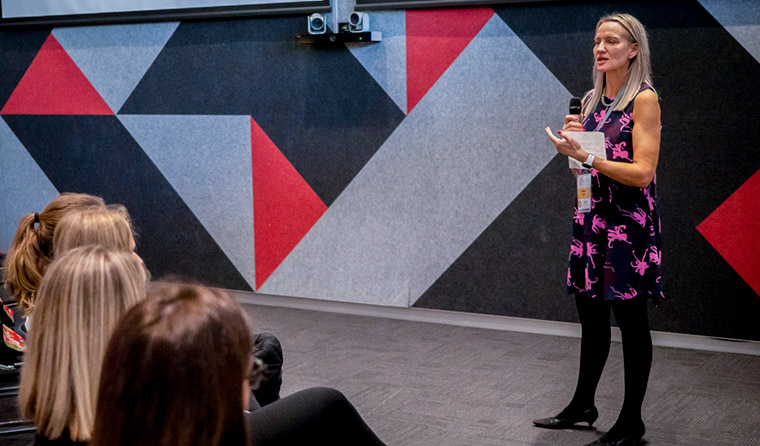News
‘Making time for yourself’: Women’s Health Week
Dr Lara Roeske closed Women’s Health Week with a comprehensive presentation about core health concerns for women throughout their lifespan.
 Dr Lara Roeske wants to help move towards ‘better health for every woman’.
Dr Lara Roeske wants to help move towards ‘better health for every woman’.
Dr Lara Roeske, Chair of RACGP Specific Interests and GP with a special interest in women’s health, helped the college commemorate Women’s Health Week with her presentation, ‘Making time for yourself’.
Dr Roeske told the audience her goal is to help move ‘towards better health for every woman’ and emphasised the importance of every person making sure they have their own trusted GP.
‘I do, and I hope many of you do’, she said.
She also urged mothers to be role models to their daughters in having their own GP, and provided advice about what patients should expect from their GPs.
‘When you see a GP for your health, they are informed by guidelines and standards and population health expectations. But, first and foremost, they have an individual person before them, and their duty is to the health and wellbeing of each woman, each person – a fundamental principle of the care you should expect when you see your GP,’ she said.
Dr Roeske then discussed a broad outline of key health issues that face women at every stage of their lives.
Pre-teens
Dr Roeske emphasised the importance of the human papillomavirus (HPV) vaccine for all children, girls and boys, countering the controversy that has surrounded the vaccine and perceptions it may encourage early sexual activity.
‘In Australia we now have the largest cohort of HPV-vaccinated women,’ she said.
‘[The vaccine is] protecting [people] against 93% of cervical cancer, vulva cancer, vaginal cancer. For men, penile cancer, anal cancer, scrotal cancer, and head and neck cancers.
‘The HPV vaccine is not about STIs [sexually transmitted infections] or sex. It’s about ensuring your children don’t develop cancer. It is as simple as that.’
Aged 15–24
Dr Roeske outlined the main areas of health concern for women in this age group as accident and injury, mental health, and contraception.
She discussed the impacts of social media and exposure to online pornography as emerging issues for young women’s mental health, and emphasised the importance of empowering them to understand sexual boundaries, have respect for their bodies and engage in prevention against unplanned pregnancy and STIs.
Dr Roeske placed particular emphasis on chlamydia as an important health issue for this age group in general.
‘It’s very important that all young women and men who are sexually active have a chlamydia test each year in general practice. Chlamydia is more often diagnosed than the sub-total of flu and whooping cough notifications together,’ she said.
She further warned that young people often do not realise how common the often-asymptomatic disease is, or how devastating its impacts, which can include infertility if left untreated.

Dr Roeske discussed a broad outline of key health issues that face women at every stage of their lives.
Aged 25–35
Dr Roeske observed that many women in this age group today may be trying to start families, which represents a break from past decades, when women tended to have their first children at a younger age.
‘Women now are delaying pregnancy until much later. Increasingly so, first births are occurring well in the 30s,’ she said.
Dr Roeske celebrated the many positive reasons women may delay pregnancy, in that they are now more likely to travel and complete education before having children. But she also wants to ensure GPs are able to have honest conversations with female patients regarding childbearing in a way that enables them to retain choice around optimal fertility.
Such conversations may involve discussion of issues such as age and lifestyle habits, while also acknowledging all options available today to assist fertility such as in-vitro fertilisation (IVF) and egg-freezing.
Aged 36–50
One of the major issues Dr Roeske cited for this age group was mental health.
‘Depression peaks for men and women in society around those [in their] mid-40s,’ she said.
Dr Roeske noted there can be a variety of reasons behind mental health problems for women, ranging from significant life events such as postnatal depression or dealing with childhood trauma, through to peri-menopause.
But whatever the reason might be, she emphasised the importance of utilising the relationship with a GP.
‘There is nothing wrong with having to see the GP fortnightly or weekly or monthly, because there is a time there when you need that kind of support and intervention, so there is someone there who will advocate on your behalf when you are feeling this way,’ Dr Roeske said.
She also emphasised the huge impact peri-menopause and menopause can have on women’s state of mind and physical wellbeing, comparing gradual testosterone decline in men to women’s quite different experience.
‘I had a great specialist, an endocrinologist, who put it beautifully: “The change in oestrogen levels for a woman is like from the top of Eureka Tower down to the ground”,’ she said.
Dr Roeske believes it is important not to underestimate the effects of this process on women’s health, and encouraged women not to be afraid of hormone treatment.
‘Don’t be scared. Consider helping yourself for a defined safe period of time,’ she said.
‘No one says you have to be on oestrogen for years; no one says you have to be on any oestrogen. But explore the options for you.’
fertility menopause mental health women’s health week
newsGP weekly poll
Are you interested in prescribing ADHD medication?